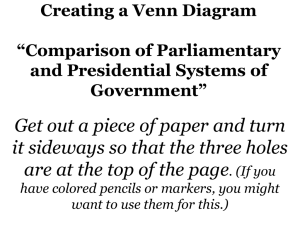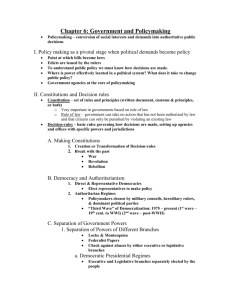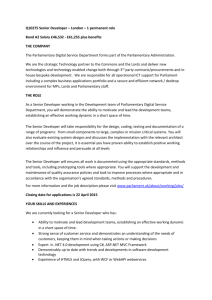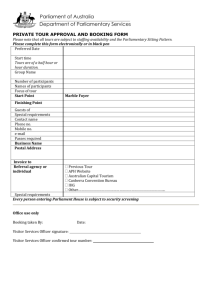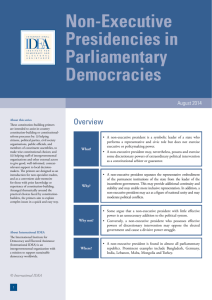Systems of Governance: What options for Zimbabwe?
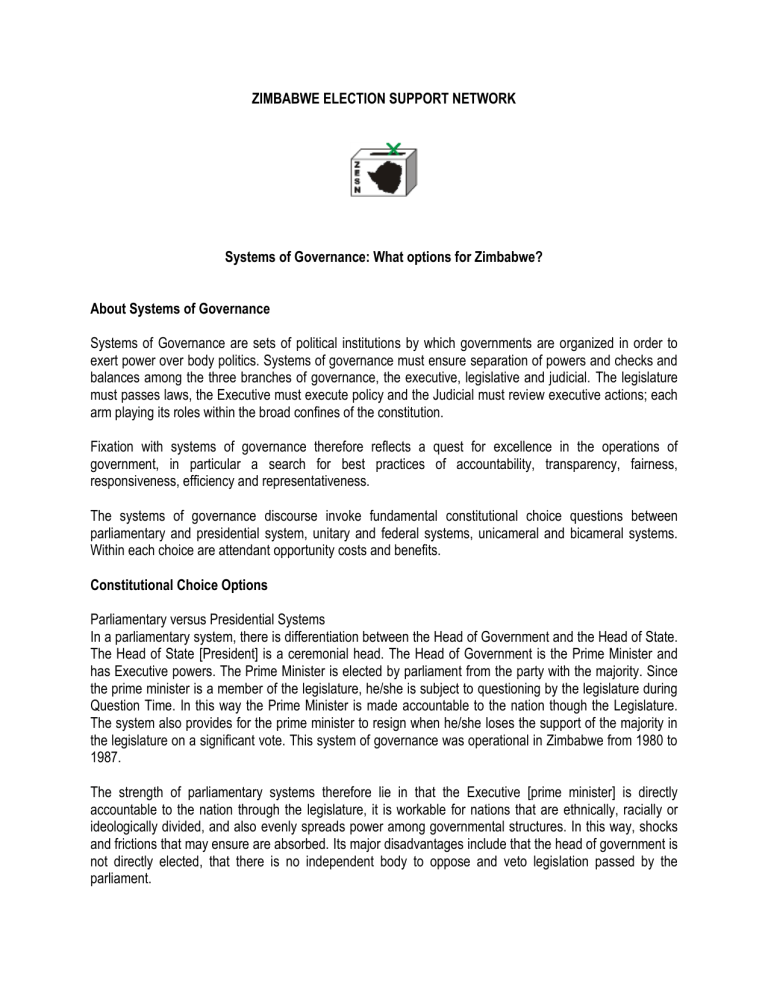
ZIMBABWE ELECTION SUPPORT NETWORK
Systems of Governance: What options for Zimbabwe?
About Systems of Governance
Systems of Governance are sets of political institutions by which governments are organized in order to exert power over body politics. Systems of governance must ensure separation of powers and checks and balances among the three branches of governance, the executive, legislative and judicial. The legislature must passes laws, the Executive must execute policy and the Judicial must review executive actions; each arm playing its roles within the broad confines of the constitution.
Fixation with systems of governance therefore reflects a quest for excellence in the operations of government, in particular a search for best practices of accountability, transparency, fairness, responsiveness, efficiency and representativeness.
The systems of governance discourse invoke fundamental constitutional choice questions between parliamentary and presidential system, unitary and federal systems, unicameral and bicameral systems.
Within each choice are attendant opportunity costs and benefits.
Constitutional Choice Options
Parliamentary versus Presidential Systems
In a parliamentary system, there is differentiation between the Head of Government and the Head of State.
The Head of State [President] is a ceremonial head. The Head of Government is the Prime Minister and has Executive powers. The Prime Minister is elected by parliament from the party with the majority. Since the prime minister is a member of the legislature, he/she is subject to questioning by the legislature during
Question Time. In this way the Prime Minister is made accountable to the nation though the Legislature.
The system also provides for the prime minister to resign when he/she loses the support of the majority in the legislature on a significant vote. This system of governance was operational in Zimbabwe from 1980 to
1987.
The strength of parliamentary systems therefore lie in that the Executive [prime minister] is directly accountable to the nation through the legislature, it is workable for nations that are ethnically, racially or ideologically divided, and also evenly spreads power among governmental structures. In this way, shocks and frictions that may ensure are absorbed. Its major disadvantages include that the head of government is not directly elected, that there is no independent body to oppose and veto legislation passed by the parliament.
In presidential systems there is a President with no Prime Minister as is the case in Zimbabwe since 1987.
The President is both Head of State and Government implying that all executive authority rests in the
President. The President is elected separately from members of parliament. While the system may provide for the impeachment of the President, in practice, it is impossible to execute it. The President is not a member of parliament and is therefore not directly accountable to Parliament.
The President as Chief Executive has wide appointive powers and can exercise wide discretionary powers in dissolving parliament and removal of vice president[s]. The president also has the power to veto laws, can appoint members of parliament, can issue decrees under certain conditions, executive powers that can weaken legislative powers. Presidential systems therefore carry the risk of an omnipresent executive.
Unicameral versus Bicameral Parliamentary System
Whether it is a parliamentary or presidential model adopted, a constitutional choice has to be made between bicameral or unicameral systems. Under a bicameral parliamentary set up, there is a Lower
[House of Assembly] and Upper House [Senate]. The Lower House which is also called the first chamber is the principal House of Parliament and is where all the representatives are directly elected. In a parliamentary system, this is the chamber from which the executive powers originate.
The Upper House or the second chamber is the Senate whose powers may purely review or definitive.
Where the Senate enjoys purely reviewing authority, it has the power to send legislation back to the principal chamber with comments. However some second chamber, as is the case in Zimbabwe, cannot stop legislation. Where an upper house has definitive powers/ powerful chamber, legislation must pass both chambers to become law. Under a unicameral system there is only one chamber. Many countries’ parliaments have only one chamber-usually the House of Assembly. Implied here is that a choice has to be made between having a second chamber with reviewing or definitive powers.
Unitary Systems versus Federal Systems
Choosing a model of governance also entails deciding between a unitary or federal system. In Zimbabwe, constitution-making processes currently underway have revived animated debates on the prospects for federalism in Zimbabwe, the issue of regional marginalization cited as major driving force.
Unitary Systems confer all political power to national/central government and are thus single, centralized governments in which all political power is exercised at the centre. While government can decentralize functions to local levels, it has power to revoke the decentralized powers. Central government establishes national laws and guidelines that are applied uniformly throughout the country.
The advantages of such a system lie in that it offers uniformity of policy and services. There is one set of government offices and employees for key government offices. Broader national interests take precedence resulting in balanced public policy. There are also high stakes of reducing discrimination against minorities because policy control resides in central government. However, the system has its own trade-offs, namely that local priorities and conditions may be sacrificed in implementing national policies and that government may be unaware of grassroots problems.
In a federal system of government, sovereignty is constitutionally divided between a central governing authority and constituent political units like states or provinces. There is self-rule and shared rule. The State resembles a miniature version of the whole in “congruent federalism”.
Advantages associated with federalism therefore include ensuring that there is devolution of power, that government remains close to the people in tune with the daily needs and aspirations, that decentralized forms of development are encouraged, that it allows unique and innovative methods for attacking social, economic and political problems, that it provides effective ways of linking together diverse people who happen to end up in a single political entity and that it is a way of resolving tensions between centre and periphery. Giving regions or states autonomy will go a long way in national healing as each region/state will have equal representation in the development of their respective areas. In the case of Zimbabwe, it ensures equal growth and development opportunities as opposed to the current system where everything is done and approved in Harare. Proponents of federalism further argue that the Zimbabwean economy now needs hands on management if national goals and targets are to be realized.
However their geographic and ethnic bases incline them prone to group conflicts and delays in making swift decisions. In Australia, the constitution can only be amended through a national referendum after a majority of voters in the affected states agree to the change. Since its federation in 1901, only eight out of 44 amendment proposals have been approved. Federal systems are also very complex. Federal Bosnia is made up of 10 cantons, a national parliament and parliamentary assembly as well as a bicameral system in both the House of Representatives and House of Peoples. Experiences in countries such as Belgium also point to myriad problems of duplication and contradictory policies in different parts of the country.
Recommendations
ZESN recommends an Executive Prime Minister and a titular [non-Executive] President. The PM should be elected while the titular President is chosen by MPs constituting an electoral college. Zimbabwe needs an
Executive that is directly accountable to people through parliament. With these changes, executive appointive powers of non constituency MPs and Provincial Governors who become MPs and Senators should be done away with. There is need to ensure parliamentary reform and legislative independence.
The Legislature’s role in ensuring transparent processes of budgeting for elections, scrutinizing delimitation processes and the workings of the election management body should be ensured.
